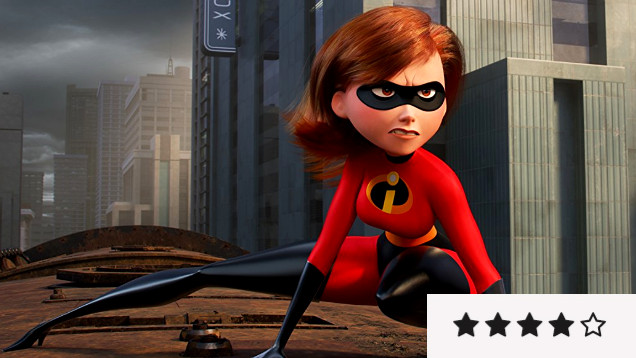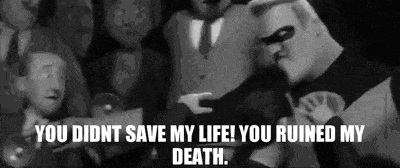Incredibles 2 review: the freshest and sassiest superhero blockbuster of the year

Since the release of The Incredibles in 2004, the idea of a movie examining a world where the general population has turned against superheroes has evolved from an interesting concept to writing that borders on hackneyed and clichéd. Directors Zack Snyder and Christopher Nolan explored these sentiments most memorably – in Watchmen and The Dark Knight, respectively – pondering ideological and bureaucratic matters that might turn people against their protectors.
Pre-empting these films and many others, in The Incredibles writer/director Brad Bird encapsulated so much in a single brilliant moment. A suicidal man, who did not want to be rescued, launched legal proceedings against the block-like do-gooder Mr Incredible (voice of Craig T. Nelson). Waving his fists and wearing a neck brace, the outraged man exclaimed: “You didn’t save my life, you ruined my death.” What a line! So loaded and cynical; so precise in its evocation of human pain and absurdity.

The film’s belated sequel, Incredibles 2, kicks off in an interrogation room, where a young boy recounts the afternoon when he witnessed the titular family ensemble attempt to foil a heist. It’s an interesting and tangential approach to pry open the narrative, though Bird’s script soon arrives at the aforementioned cliché. The failed heist-foiling cost the city significant amounts in damages. Politicians had already passed laws to prevent heroes fighting crime, intensifying the fall-out.
Instead of rehashing a rote narrative about shamed and shunned heroes, Bird adds a much more interesting concept. Super rich telecom entrepreneur Winston Deavor (Bob Odenkirk) arrives with a plan to restore superheroes to prominence, believing they need to be rebranded. Deavor singles out Elastigirl (Holly Hunter) to lead the charge, attaching body-cams to her and building a media profile. In Winston’s view, superheroism should be a commercial for itself. The battle this time is ultimately about marketing: costumed crusader hijinks meets Gruen.
A villain emerges in the Screenslaver, who uses hypnotic screens to exert mind control over viewers. Dressed in a mask with oversized glowing googles, he rants and raves about the media while hatching nefarious plans – like Howard Beale crossed with a Bond villain. The first hand-to-hand combat scene involving the primary villain, with its violently aggressive black and white strobe effect, might have been accompanied by an epilepsy trigger warning. This is a rare moment when the film draws attention to its own aesthetic; it’s easy to take for granted Bird’s striking, gloss-lacquered images.
The Incredibles – known in their ordinary lives as the Parr family – get VIP treatment, moving out of a shabby hotel and into an ultra-modern abode, with remote controlled floor panels that malfunction like something out of a Jacques Tati film (Playtime, perhaps). Mr Incredible, or Bob, discovers that staying home and looking after the kids – Violet (Sarah Vowell), Dash (Huck Milner) and baby Jack-Jack – is more difficult than saving the city. This feeds into a sentimental message left implied rather than directly stated: that being a good parent is the greatest superhero act of them all.
The freshest and sassiest superhero blockbuster of the year
Screenslaver also got the marketing memo. He returns advertorial fire, believing that public perception is more powerful than any ray gun or death machine. This film is about marketing, whereas most superheroes movies – in recent examples, the sensationally mediocre Avengers: Infinity War and the ‘made to go viral’ Deadpool 2 – represent rather shameless forms of it.
The result is the freshest and sassiest superhero blockbuster of the year, made with genuine belief that an audience’s allegiance to a brand should not be taken for granted. In this sense Infinity War is the polar opposite of Incredibles 2. In their long-faced Avengers movie, directors Anthony and Joe Russo pedalled an elaborate kind of indoctrination, believing (with despairing accuracy, given the film’s popularity and unconscionable rubber stamping from critics) that viewers should be asked to accept the absence of things – a final act, or visual inventiveness – rather than gratified by actual ideas.
Infinity War is Screenslaver, advocating the hypnotic allure of empty spectacle: look at this shiny thing and forget that brain of yours. Incredibles 2 is the Winston Deavor character, believing in the power of branding but also the value of inspirational narratives. The film isn’t perfect (with one too many showdowns involving huge moving vehicles) but nobody can say it isn’t thoughtful. Going forward, what a crazy idea for makers of superhero films to keep in mind: take the time to develop an interesting perspective. Your movie might then be, heaven forbid, interesting.

















